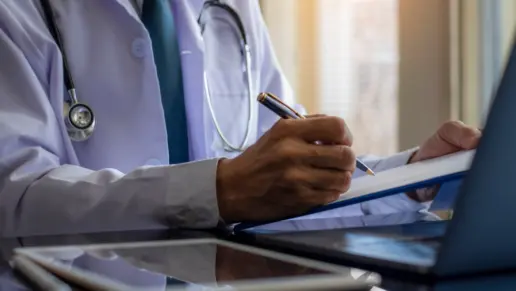Relapse occurs when someone retakes a substance after a period of abstinence. Often this involves one or more substances to which they are addicted. The National Institute on Drug Abuse states that addiction is a chronic, relapsing disorder characterized by compulsive drug seeking and use despite adverse consequences.
Relapse is an intrinsic part of what it means to have an addiction (otherwise known as substance use disorder) and, therefore, a part of recovery from addiction. Relapsing does not mean that addiction treatment has been unsuccessful or someone is destined not to overcome their addiction. It simply means that they need to try again, reenter treatment or learn new ways to cope with situations that are triggers for them.
Although relapse is common, it should not be underestimated or normalized to the extent that patients and medical practitioners do not continue to strive to prevent it. Countless individuals lose their employment, families, freedom, and even lives as a consequence of relapses.
Knowing the signs of relapse and available treatment options can enable you to help yourself or a loved one remain on the path to long-term addiction recovery.
What Do Drugs and Alcohol Do to the Brain?
One of the critical things to be aware of regarding drug or alcohol abuse is that it can affect the brain long after the last dose. Some people mistakenly believe that addicts relapse due to a lack of willpower, but drugs can alter important brain areas that can drive the compulsive drug use that marks addiction.
Substance use promotes the release of dopamine in the brain. Dopamine is a neurotransmitter associated with pleasure and reward, but the darker side of dopamine is the intense feeling of reward people feel when they take drugs. This sense of reward reinforces the desire to take the substance to experience the same feeling repeatedly. Fluctuating dopamine levels can cause mood swings, and long-term can cause someone to suffer from anxiety and chronic depression. This long-term effect on the brain is one of the reasons why someone with a substance use disorder must continuously work on their sobriety.
What Is a Relapse?
Sobriety from addiction to alcohol or drugs can happen for various reasons. This abstinence may follow medical detox and addiction treatment in an inpatient or outpatient setting. Alternatively, it can be due to an individual deciding to abstain alone, a stint in prison, or other reasons.
One study reported that the five main reasons people reported for abstaining from illicit drugs were:
- Concerns about physical health
- Lack of interest
- Harmful psychological consequences
- Personal beliefs/morals
- Peer/family disapproval
If someone resorts to drug or alcohol use after a period without it, they are considered to have relapsed. The severity of relapse is dependent on many factors, including the substance that they used, whether they had an addiction to it previously, the effect it has on their life and the lives of those around them, and what the long-term implications of use are, such as effects on health.
The chance of relapse is directly related to the length of time in recovery. One study of nearly 1200 participants found two-thirds relapsed within one year. For those in recovery for over one year, the number that relapsed fell to 50%. This number was reduced further to only 15% after five years of recovery.
Why Does Relapse Happen?
Even if someone has a powerful motive to abstain from drugs or alcohol, they are likely to have times when they are tempted to use it again. If the resolve to stay sober starts to slip for any reason, it can lead to a relapse. Reasons why relapse happens include:
To alleviate cravings
When someone abstains from a substance, especially in the first few weeks and months, they will likely experience cravings for it. These cravings can be intensified around certain people or places and require significant effort to overcome. They may also suffer from withdrawal symptoms that differ from drug to drug but can include nausea, insomnia, and mood swings. There can be a great temptation to alleviate these symptoms by taking the substance again.
When facing triggers
Addicts often face relapse triggers that encourage them to take the substance. Common triggers include people, places, or situations associated with their life using drugs. As part of addiction treatment, individuals are encouraged to avoid high-risk situations where they may face their triggers or, if this is not possible, develop new skills for dealing with times when they feel the urge to use drugs.
To deal with stress and emotional distress
For many people, using drugs or alcohol is a way to escape everyday life or relax when facing challenging, upsetting, or stressful situations. Exposure to stressors is a major risk factor for drug relapse after periods of recovery. To avoid old habits, those abstaining from drugs or alcohol need to develop new coping strategies for alleviating stress and helping them relax, such as meditation or exercise. Drug use can also alter a person’s brain and hamper their long-term ability to manage stress successfully. One study into cocaine use disorder found that cocaine causes neuroadaptations in the stress and reward circuits in the brain, which increase susceptibility to relapse.
The user believes they are in control
When someone has successfully abstained for a while, they may think they can control their substance use and not become addicted again. Testing this theory could result in a one-off minor lapse or the start of a full relapse into the same situation they were in previously, if not worse.
Feeling unsupported
When users feel like they are not being helped in their addiction recovery process or do not have social support, they are more likely to revert to old behaviors. As a supportive friend or family member, it can be essential to reassure the addicted person that they are making good progress and that their efforts are recognized.
When experiencing physical pain
For many addicts, especially those that have an addiction to prescription painkillers, physical pain can be particularly challenging. If someone has a painful condition, injury, or operation, the temptation to take painkillers can be overwhelming. A medical professional must manage this situation to avoid addiction relapse.
The substance has been replaced with another
People with a substance use disorder may believe using one substance is preferential to another. An example may be to swap taking opioids to drinking alcohol excessively as they have a similar effect. This behavior may cause a secondary addiction to the replacement substance or cause the person to lapse in judgment and give into temptation, leading to them retaking the original substance.
What Makes Someone Prone To Relapsing?
Although the chance of relapse after alcohol or drug addiction treatment is high for everyone, certain risk factors identify those more prone to relapse. These risk factors include family conflicts, psychological stress, peer influence, socio-economic statuses, such as availability and accessibility of drugs, and peer group influences. Specific examples of clinical, biological, and neural measures that are predictive of addiction relapse include:
Mental health issues
Many studies identify a link between mental health conditions and substance use disorder (SUD). As many as one in four individuals with a serious mental health illness such as chronic depression, bipolar disorder, or schizophrenia also have a SUD. In line with the chance of developing a SUD in the first place, someone with a co-occurring mental health condition (either one that they had before or developed as a result of their substance abuse) is at a higher risk of relapse.
Past trauma
An individual with past trauma, especially trauma experienced as a child, such as abuse and neglect, is more prone to developing an addiction and relapsing. These experiences have a detrimental impact on the brain, contributing to a cycle of emotional and behavioral problems, and addiction.
Newly abstinent
People that have only recently stopped taking the substance are more prone to relapse. One reason is that the user may suffer from withdrawal symptoms, and the craving to take the substance to alleviate their symptoms is intense. Another reason, as identified by a study into recently abstinent cocaine users, is that the individual’s sensitivity to stress is more pronounced, making them susceptible to relapse.
Adrenal sensitivity
Those with autoimmune diseases and problems related to the adrenal gland can be more prone to relapse as they have a cortisol deficiency. This hormone regulates stress levels in the body. One study of those with alcohol addiction found a significant effect of high adrenal sensitivity and increased stress on subsequent alcohol relapse.
Not completing treatment
Individuals who do not complete their addiction treatment program or commit to an aftercare plan are at significantly higher risk of relapse. A study into opiate-addicted people showed that those who completed the entire six-week inpatient treatment program had a significantly delayed chance of relapse.
Overdose Risk Following Relapse
Aside from the general risks associated with addiction, such as long-term health implications and impaired decision-making, overdose is the most significant risk of relapse. When someone abstains from taking a drug for a while, their tolerance reduces. If they start again at pre-abstinence levels, this can cause overdose and death. This risk is particularly prevalent for opioid users, who are at an increased risk for accidental overdose following relapse.
Types of Relapse
People often think of relapse as using the substance; however, there are three levels of relapse, and only the third involves taking the drug. It is essential to be aware of the three levels, how they develop, and how they impact the likelihood of a person relapsing. There is an increased chance of quick and successful preventative treatment if relapse is addressed at an earlier stage. The three types of relapse are emotional, mental, and physical:
Emotional Relapse
At this stage, individuals are not thinking about relapsing and are still committed to sobriety. They are, however, starting to experience negative thoughts and feelings, which may lead them to forget their resolve to remain sober. They may begin to act in self-destructive ways. The denial can make it particularly challenging to address the risk of relapse at this stage as the person may not see that there even is a risk.
Mental Relapse
During a mental relapse, the individual starts to think about using the substance again. They are torn between feelings of wanting to use the substance and not wanting to use the substance. They begin to struggle to cope with everyday situations and have the potential to start using the drug again if the opportunity arises.
Physical Relapse
Physical relapse is when a person starts using the substance or substances again. There are two different types of physical relapse – lapse and relapse. A lapse is a one-off, short-lived or accidental use of drugs or alcohol, whereas a relapse is a return to pre-abstinence levels of the substance to which they have an addiction. When they lapse, the addicted person can experience feelings of self-blame and uncontrollability, which can trigger another relapse unless dealt with appropriately.
How Can I Tell That Someone Is at Risk of Relapse?
Depending on the stage of relapse that someone is in, there are some warning signs that you can look out for that might indicate that they are at risk of reigniting their addiction.
Signs of Emotional Relapse
- Isolating themselves: Someone who is starting to struggle emotionally may distance themselves from friends and family.
- Not showing emotions: Although they may be experiencing some negative thoughts and feelings, they are reluctant to express them.
- Reduced involvement in treatment programs: At this stage, the individual is still committed to sobriety and will likely continue with treatment but may not contribute as actively as before.
- Projecting concern onto others: To distract themselves and other people from the negative feelings that they are experiencing, the individual may start putting the focus on other people’s problems instead.
- Poor self-care: This could be emotional or physical. A person at risk of relapse may start to not take care of their basic needs, such as sleeping, healthy eating, and hygiene. At this stage, they may benefit from a reminder of the HALT acronym used in many addiction treatment programs. Standing for hungry, angry, lonely, and tired, it asks a person to focus on their basic needs and address them before taking drugs or alcohol.
- In denial: During this stage, the individual may be in denial about what is happening. Or they may be unwilling to address the situation for fear of failing in their recovery.
Signs of Mental Relapse
- Looking for an escape: When someone has been experiencing the negative emotions associated with an emotional relapse for some time, they may start to feel disheartened and unmotivated in their recovery. They may be thinking about using drugs to escape these unwanted feelings.
- Thinking about the past: If someone is torn with feelings regarding whether to use the substance again or not, they may start to recall people, places, and situations associated with their past drug use. In doing so, they may try to glamorize this time in their life. They may underplay the risks they took previously.
- Devising strategies for use: A tell-tale sign that someone is considering using drugs again is when they start to create ways in which, this time, it will be different. They may have a strategy to manage the situation better to avoid repeating their former addictive behavior, such as only using the substance on special occasions.
- Becoming secretive: Lying and deceitful behavior goes hand in hand with substance abuse. Someone considering retaking drugs will likely return to some past secretive behaviors, such as not disclosing their whereabouts.
Signs of Physical Relapse
When someone physically relapses, the signs are similar to the development of the initial substance use disorder. The National Institutes of Health identifies some warning signs of addiction as follows:
- Insomnia
- Anxiety or depression
- Problems with memory
- Irritability and mood swings
- Frequently refilling prescriptions
- Increasing the amount of medication used
- Lack of interest in usual things
- Unexplained excessive energy
What Treatment Is Available for Addiction Relapse?
If you are worried that you or a family member is at risk of relapse, you should seek professional help as soon as possible. Addiction treatment centers are available across the U.S.; early recovery is possible if help is sought quickly. The most appropriate treatment plan will depend on an individual’s circumstances, the stage of their relapse, and whether or not they have previously been treated professionally for addiction.
Emotional or Mental Relapse Treatment
If the person is at the beginning stage of relapse, they will likely require treatment specifically related to their personal triggers, thoughts, and feelings to avoid them relapsing completely. Behavioral health therapies are often used at this stage to help people in drug addiction treatment modify their attitudes and behaviors related to drug use. As a result, patients are able to handle stressful situations and various triggers that might cause another relapse.
Examples of treatments that may be employed are:
- Cognitive behavioral therapy (CBT)
- Contingency management
- Motivational enhancement therapy
- Family therapy
- Twelve-step facilitation
Physical Relapse Treatment
If the person has relapsed fully, the treatment offered will be similar to the initial substance abuse treatment. It may involve detox from the substance managed by healthcare clinicians, followed by inpatient treatment or intensive outpatient treatment. They may also require medication-assisted therapy (MAT).
MAT involves using medication to manage withdrawal symptoms and cravings. SAMHSA (Substance Abuse and Mental Health Services Administration) states that MAT can help prevent relapse and facilitate longer periods of abstinence when used with an integrated treatment plan. MAT should always be supported by a program of other treatments, such as CBT and holistic therapies, including meditation and mindfulness. This is essential because relapse rates are extremely high after medically supported withdrawal alone, though
Whichever treatment program is deemed the most suitable, if the individual has already started to retake the substance, they need treatment as soon as possible to reduce the chance of overdose and promote long-term recovery.
Relapse Prevention Treatment
Regardless of a person’s relapse or addiction treatment stage, they will likely benefit from Marlatt and Gordon’s relapse prevention model (RP). This treatment involves specific interventions that identify the high-risk situations for each patient and enhance their coping skills. Proven effective in studies, this model is based on alcohol abuse, but the techniques are transferable to other addictions.
Relapse Prevention Planning
Addiction treatment should also include a relapse prevention plan regardless of whether someone has a history of relapse or not. This plan should address the patient’s potential triggers and the coping mechanisms they will employ to avoid relapsing. The prevention plan will identify an individual’s support system for long-term rehabilitation.
Where Can I Find Help for Someone at Risk of Relapse?
If your loved one has already received professional addiction treatment, you should contact their treatment provider. They can offer help and support tailored to the person’s circumstances.
If they have not undergone formal treatment, it was a long time ago, they have since moved, or you do not know where they were treated, there are other trusted resources that you can turn to for advice and support:
SAMHSA’s National Helpline is free and confidential and available daily. You can get advice on treatment options for addiction relapse by calling: 1-800-662-HELP (1-800-662-4357).
Rehab.com
Rehab.com offers trustworthy online resources and a helpline. Call now at (833) 386-0206 to be connected to treatment providers that care.
Support Groups
Narcotics Anonymous, Alcoholics Anonymous, and other support groups are available across the U.S. As relapse is so common, you will likely meet with other people in the same situation and receive invaluable peer support to assist you with getting back on track.
Addiction has debilitating effects on a person and their loved ones. Seeking addiction treatment is a brave step and recovery is possible. Learning how to live without drugs takes practice, so long-term recovery is not a quick process. There is always a risk of future relapse, and knowing the signs and what you can do can help prevent a full relapse. Ongoing commitment, motivation, and support from friends, family, and professionals are needed to avoid relapse and achieve a life free from addiction.
Addiction Centers That Offer Aftercare Support
Finding facilities near you…




